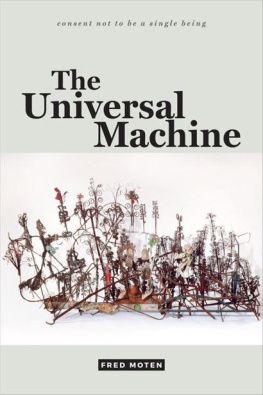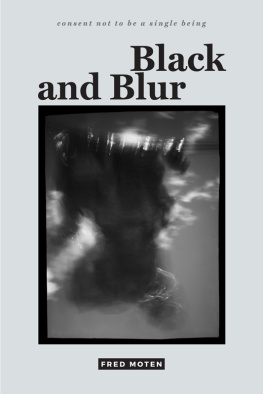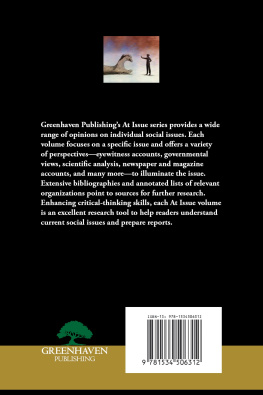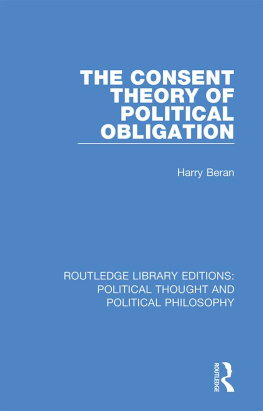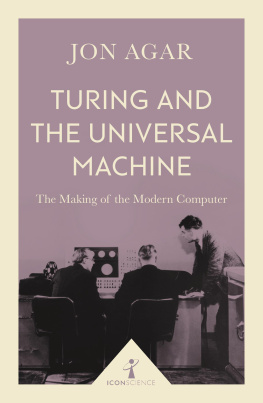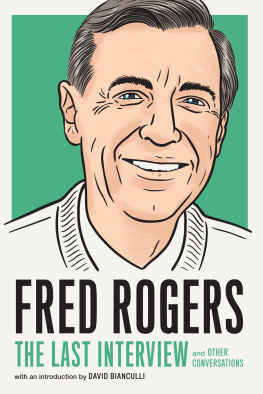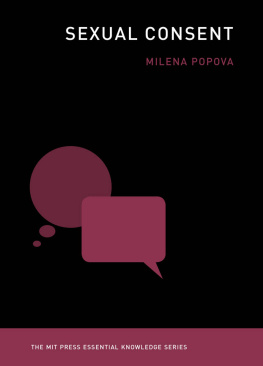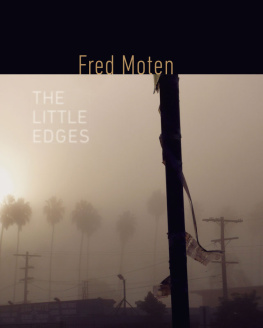Fred Moten - The Universal Machine (consent not to be a single being)
Here you can read online Fred Moten - The Universal Machine (consent not to be a single being) full text of the book (entire story) in english for free. Download pdf and epub, get meaning, cover and reviews about this ebook. year: 2018, publisher: Duke University Press, genre: Science. Description of the work, (preface) as well as reviews are available. Best literature library LitArk.com created for fans of good reading and offers a wide selection of genres:
Romance novel
Science fiction
Adventure
Detective
Science
History
Home and family
Prose
Art
Politics
Computer
Non-fiction
Religion
Business
Children
Humor
Choose a favorite category and find really read worthwhile books. Enjoy immersion in the world of imagination, feel the emotions of the characters or learn something new for yourself, make an fascinating discovery.
- Book:The Universal Machine (consent not to be a single being)
- Author:
- Publisher:Duke University Press
- Genre:
- Year:2018
- Rating:3 / 5
- Favourites:Add to favourites
- Your mark:
- 60
- 1
- 2
- 3
- 4
- 5
The Universal Machine (consent not to be a single being): summary, description and annotation
We offer to read an annotation, description, summary or preface (depends on what the author of the book "The Universal Machine (consent not to be a single being)" wrote himself). If you haven't found the necessary information about the book — write in the comments, we will try to find it.
The Universal Machine (consent not to be a single being) — read online for free the complete book (whole text) full work
Below is the text of the book, divided by pages. System saving the place of the last page read, allows you to conveniently read the book "The Universal Machine (consent not to be a single being)" online for free, without having to search again every time where you left off. Put a bookmark, and you can go to the page where you finished reading at any time.
Font size:
Interval:
Bookmark:
consent not to be a single being
Th e Uni versal Machine
FRED MOTEN
DUKE UNIVERSITY PRESSDURHAM AND LONDON2018
2018 Duke University Press
All rights reserved
Printed in the United States of America on acid-free paper
Designed by Amy Buchanan
Typeset in Miller by Westchester Publishing Services
Library of Congress Cataloging-in-Publication Data
Names: Moten, Fred, author.
Title: The universal machine / Fred Moten.
Description: Durham : Duke University Press, 2018. | Series: Consent not to be a single being ; [v. 3]
Identifiers: LCCN 2017036792 (print) | LCCN 2017056619 (ebook)
ISBN 9780822371977 (ebook)
ISBN 9780822370468 (hardcover : alk. paper)
ISBN 9780822370550 (pbk. : alk. paper)
Subjects: LCSH : Black racePhilosophy. | BlacksRace identityPhilosophy. | Philosophy, Black. | RacismPhilosophy.
Classification: LCC HT 1581 (ebook) | LCC HT 1581 .m6846 2018 (print) | DDC 305.89601dc23
LC record available at https://lccn.loc.gov/2017036792
Cover art: Thornton Dial, Monument to the Minds of the Little Negro Steelworkers , 20013. Steel, wood, wire, twine, artificial flowers, ax blade, glass bottles, animal bones, cloth, tin cans, paint-can lids, and enamel; 38 x 76 x 46 inches. 2018 Estate of Thornton Dial / Artists Rights Society ( ARS ), New York.
CONTENTS
Earlier iterations of some of the writing collected here appeared in the journals African Identities , Criticism , and South Atlantic Quarterly as well as in the following books: The Oxford Handbook of Critical Improvisation Studies , ed. George E. Lewis and Benjamin Piekut (Oxford University Press); Hannah Arendt zwischen den Disziplinen , ed. Ulrich Baer and Amir Eshel (Wallstein Verlag); and Fanon postcoloniale: I dannati della terra oggi (Ombre Corte).
The Universal Machine is a monograph discomposed. Riding the blinds gone way off the rails. Though a certain movement might be discerned from object to thing to no-thingness, in general, and in the generative absence of a teleological principle, what you have here is a swarm. I hope its also a party cum polygraph, establishing truth by feel(ing) despite juridical and philosophical inadmissibility. The swarm has no standing, troubles understandings proper subjects and objects, even when both are radically misunderstood as things. It is not so much antithetical to the rich set of variations of phenomenological regard; rather, it is phenomenologys exhaust and exhaustion. On the one hand, phenomenologys comportment toward the thing itself (as given in experience, as consciousness) is deformed by an insufficient attention to the thing itself; on the other hand, phenomenologys assumption of thingly individuation renders no-thingness unavailable and unavowable. What remains of phenomenology in this fallenness and being-thrown? The social life of no-things bumps and thuds and grunts in plain song. When phenomenology is exhausted, no-thing insists on social life. Frantz Fanons adherence to phenomenologys possibilities is given as a kind of manifesto for sociogeny expressing disbelief in social life, wherein the new discipline he invokes and practices takes the form of an autopsy report. It is pathontology (as opposed to paraontologyW. E. B. Du Bois had already discovered the necessity of an improvisation [a movement; a dehiscence; a quickening] of ontology for the study of social life, as Nahum Chandler teaches us) and therefore relatively unattuned to (what) remains, the exhausted, its marked breath and black lung. presence in motion, generative incoherence, black matter in black operation. Idle talk gathers around things in their diffusion, the internal and external sociality of things-in-themselveslessness. Its not that theres no such thing as things-in-themselves; its just that such things are other than themselves. Such (dis)appearance is deep and not to be trifled with.
What if phenomenology were improperly, generatively (mis)understood as a set of protocols for the immanent critique (degeneration, corrosion, corruption) of its object, namely the transcendental subject of phenomenology? Lets say that deconstruction is the ongoing history of this misunderstanding, this refusal to understand. If we wanted to broaden this out, take it outside the proper philosophical enclosure, identify this movements historicity in and as something that is both more and less than a performative mode, we could call it improvisation rewoundit might sound out something of that recursive predication that George Lewis calls Toneburst. Phenomenology is there beside this irruption that places phenomenology beside itself. The soloist refuses to be one and this consent not to be single worries the joint composure of phenomenology, ontology, and politics past the point of distraction, where the lineaments of an aesthetic sociology await their incalculable arrangements. This swarm is on the way, and wants to help make the way to that rendezvous, happily consenting to such diffusion while counting on you to push it along.
More generally, the swarm is always only on the way. Its Unm ndigkeit , translated as minority or immaturity, is, more literally, unprotectedness or, perhaps, what it is to be ungoverned, as what is out of hand or unhanded (as if Spillerss echo anticipates this) in having been handed; not in hand, not in good hands, ungrasped, unowned, passed around. In order not to fly off the handle, not to have his hand or head fly off in some anti- and ante-analytic traversal and retraversal of every Knigsberg bridge, Kant pulls back from the general impropriety, the general expropriation, that he also gestures toward or opens ontothe dark time or black time of the enlightenments commonunderground, the double edge of the fact that modern times have only ever been dark. This longtemps of darkness and its black light, its open and general obscurity, is seen by everybody but the overseer in his blindness. Kant wants us to get a hold of ourselves. But why dont we let ourselves go? See, in spite of all this omnipresent law enforcement, because we want to hear and taste and smell and feel, we cant go very long without trying to talk about some art.
The Universal Machine offers three suites of essays on Levinas, Arendt, and Fanon, key figures in a certain dissident strain in modern phenomenology. Dissident strains usually operate under the shadow of a question concerning the humanity they cannot assume. Such dissidence often stretches out in the direction of a displacement of the human that appears to exert gravitational force as if it were a body. Whats at stake is not just the strangeness of displacements capacity to attract but also a more general unease regarding the very idea and, as Gayle Salomon puts it, assumption of a body. Jan Patoka can, with some confidence, proclaim that
we arrived at the conclusion that the world in the sense of the antecedent totality which makes comprehending existents possible can be understood in two ways: (a) as that which makes truth possible for us and (b) as that which makes it possible for individual things within the universum , and the universum as a sum of things, to be. Here again the phenomenon of human corporeity might be pivotal since our elevation out of the world, our individuation within the world, is an individuation of our subjective corporeity; we are individuals in carrying out the movements of our living, our corporeal movements.
On the other hand, in the wake of phenomenologys distress, Levinas, Arendt, and Fanon will have never fully arrived at that conclusion, having been forced to speak from, if not always of, a corporeity under profound relative distress. Their speech and thought produce powerful and profound echoesperhaps most intensely and shatteringly in the work of Frank B. Wilderson III as it engages with and follows from that of Hortense Spillersthat explore the unlivable, postlivable, yet undercommonly lived experience of that distress up to the point where relative deprivation opens out onto absolute chance. If in their corporeity, humans stand at the boundary between being, indifferent to itself and to all else, and existence in the sense of a pure relation to the totality of all there is, then these essays tend toward the exploration of chance outside of the relation between self and world. Chance is the way of all (irregular) flesh as it breathes and bears the palpable air of buried, undeniably anearthly life whose terrible beauty has been the aim and essence of black study all along.
Next pageFont size:
Interval:
Bookmark:
Similar books «The Universal Machine (consent not to be a single being)»
Look at similar books to The Universal Machine (consent not to be a single being). We have selected literature similar in name and meaning in the hope of providing readers with more options to find new, interesting, not yet read works.
Discussion, reviews of the book The Universal Machine (consent not to be a single being) and just readers' own opinions. Leave your comments, write what you think about the work, its meaning or the main characters. Specify what exactly you liked and what you didn't like, and why you think so.

